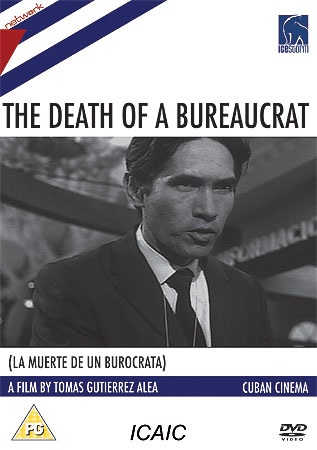
DEATH OF A BUREAUCRAT
Cuba, 1966, 84 minutes, Black and white.
Salvador Wood, Silvia Planas, Manuel Estanillo.
Directed by Thomas Alea Guttierez.
Death of a Bureaucrat has become a Cuban classic. It was made in the early years of the Castro regime, in the mid-'60s. It is critical of the regime and the development of bureaucratic control in revolutionary Cuba.
The film is a black comedy with excellent humorous touches - influenced by the cinema styles of Hollywood. It was directed by Thomas Alea who continued his career in Cuba, making such films in the '70s and '80s as The Last Supper.
The film has excellent black and white photography, a mixture of realism and surrealism - and it is of universal appeal in its critique of the bureaucratic mentality and its oppression of individuals.
1. An entertaining comedy? The quality of the humour? The serious undertones? Cuba in the '60s? Development of bureaucracy? The universal message?
2. The work of Thomas Alea in the Cuban film industry? His universal skills? His Cuban style? His interpretation of Cuba during the Castro decades?
3. Black and white photography? The authentic locations? The black and white photography for realism, for fantasy, surreal ism? The use of light and darkness? Cemeteries, streets, offices? The range of cinematic techniques: the speeding up of the action, the swift editing? The echo of American and European comedies, farces - with chase sequences? The parody of Ingmar Bergman and Fellini - dream sequences?- The humorous symbols inserted: the Grim Reaper, the Dracula fangs? The musical score? Enjoyment for cinema buffs?
4. The basic situation: the worker and the tribute to him, the comic review of his life (with echoes of Charles Chaplin in Modern Times, Metropolis and the comedies of the absurd)?
5. The funeral. the grief, the conducting of the funeral, the highlighting of the importance of the deceased's card, the pomp in burying it - and the bureaucratic consequences?
6. The focus on his widow - her grief, coping, the black comedy of the body reappearing, having to be held in the house etc.?
7. The focus on the nephew: an ordinary young man. his odyssey in trying to get permission to exhume his uncle: the experience of the officers, the officials, the impositions of bureaucracy? His treatment, the queues, the tables, the stamps, the smooth talk, the hard talk? The issues: the insurance for his aunt and the validity of the card, the need for the exhumation of the body, the further need to steal the body, bury it? The hardness of the cemetery director?
8. The farce and the experiences for the nephew? The audience sharing his exasperation? The reaction to the officers and their appearance, the desks, the queues, the personnel, their manners? Issues, causes?
9. The comedy of the digging up of the body and the humour about cemeteries? The carting of the corpse, the corpse at home, trying to bury it? Slipping the corpse into the cemetery etc.?
10. The nephew and his growing exasperation. the killing of the cemetery director - and the irony of a way to bury his uncle?
11. The film's comment on socialist governments, socialisation and bureaucracy, bureaucratic stupidity? Forms and regulations versus people? The memorable comment on bureaucracy via the variety of humour?